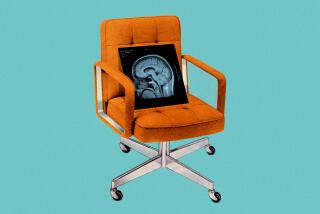High-Level Intelligence on Brainiac Snack Foods
- Share via
The other day I wasn’t feeling clever, so I picked up a candy bar called Think! You know, one of those snacks or supplements packed with herbs that are supposed to beef up brain power. There’s a bunch of them out there, with names like Intellect and Brain Booster--bars as well as pills, gums, herbal extracts, sodas and powdered “memory enhancement” think drinks.
Anyway, the chocolate mocha-flavor bar did make me think. “Why,” I thought, “do health bars always taste like this? And how does one adequately depict, with mere words, the distinctive gustatory sensation of such comestibles?” (As you can see, the bar was already affecting my vocabulary.)
The ginkgo biloba, ginseng, phosphatidylserine (huh?) and other substances in the bar have long since left my system, so I can’t quite recall what words I finally chose (though “chewy yet mealy” come close). But the question, in any case, is whether these bars really help people think better.
We called Dr. Gary Small, director of the UCLA Center on Aging, who did own up to having a packet of Brain Gum on his bookshelf. But he doesn’t take it, he says--in fact, he’s highly skeptical of these products. He certainly doesn’t recommend them for his patients.
True, he says, there have been studies suggesting that ginkgo and some of the other substances in these bars may boost thinking in people with dementia, but he--and a lot of his colleagues--think the results aren’t clear-cut. And, he adds, since herbal supplements are unregulated by the Food and Drug Administration, you don’t know how much extract you’re getting or how pure it is.
If you’re seriously worried about your memory, get it checked out, says Small. If you want to maximize alertness, he recommends (as does your mom, no doubt) a balanced diet, adequate sleep and exercise, and vitamin supplements. (Vitamin E, he says, does seem to slow decline in people with Alzheimer’s, and is relatively inexpensive and nontoxic; vitamin B12 deficiency--though rare--can cause memory impairment.)
And keep your brain active--think, read, do crosswords, etc., since studies suggest that, with the brain, it’s partly a case of use it or lose it.
Time Travel and Your Brain
If I wasn’t feeling clever the other day, I was--let’s be honest--feeling crabby. I mean, I was batted awake an hour earlier than usual by two cats who flick their tails in disdain at human clock changes.
But I really shouldn’t have complained. After all, even though any clock change can result in sleep disturbances for a few days--it’s rather like jet lag, after all--”falling back” is better than “springing forward,” if Stanley Coren, psychologist at the University of British Columbia, is to be believed.
Turning the clocks forward, we lose an hour in bed. Turning them back, we gain an hour. Coren, who thinks people in modern societies are sleep-deprived to begin with, reported a few years back that traffic accidents in Canada on the Monday after the spring clock change were 7% higher than normal--while accidents after the fall change were lower than usual. He thinks it’s because drivers are less alert on that springtime Monday, and more alert on the fall one. (Other, subsequent studies support these findings, partly or wholly: Even the stock market dips, it appears, after the spring change.)
Adolescents should be happy about the fall clock change, since their inner body clocks make them naturally inclined to sleep late. Night-owl adults should rejoice for the same reason. So sorry about all you larks out there.
Empowering Senior Moments
Finally, we read about an amazing-sounding study published in the Journal of the American Geriatrics Society. In the study, researchers split 47 healthy men and women with an average age of 70 into two groups.
When people in one group sat in front of computers, they were subliminally flashed (too quickly to consciously notice) complimentary, empowering words about being elderly--like “wise,” “astute” and “accomplished.” The other group was flashed less-nice words, like “senile” and “dependent.”
In walking tests, those who’d been subliminally exposed to empowering words increased their walking speed by 9%, while the group who was flashed demeaning words showed no increase. As if, say the authors, eroding negative stereotypes about getting old added swing to people’s steps.
My parents are in town, and neither are exactly long-distance runners. I think I’ll experiment on them.
More to Read
Eat your way across L.A.
Get our weekly Tasting Notes newsletter for reviews, news and more.
You may occasionally receive promotional content from the Los Angeles Times.










